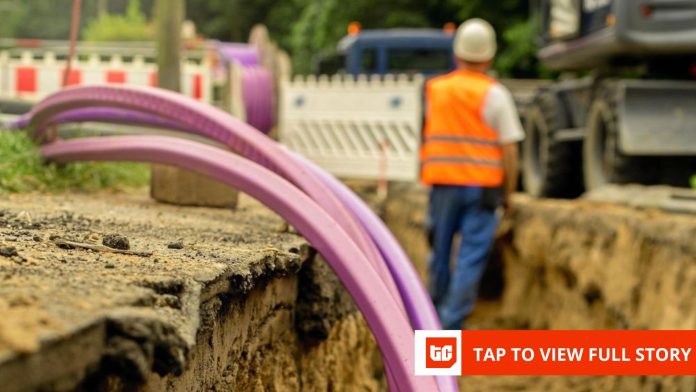Since 2020, Nigerian governors have made bold pledges to waive Right-of-Way (RoW) fees for telecom operators as part of a national push to accelerate broadband penetration. The move, championed by the then Minister of Communications and Digital Economy, Isa Ali Pantami, was seen as a breakthrough that would bring down costs for operators and make data more affordable for millions of Nigerians. Five years later, industry leaders say the reality tells a different story:
Only Anambra, Kaduna, Katsina, and Kwara have truly implemented zero RoW, according to a list TechCabal obtained exclusively from a mobile network operator. This patchy implementation has become a drag on the industry’s growth. Operators say hidden charges and inconsistent state policies still inflate deployment costs, slowing down the fibre builds needed for affordable, high-quality connectivity. The gap between political pledges and ground reality is widening, with Nigeria’s broadband ambitions caught in the middle.
Gbenga Adebayo, president of the Association of Licenced Telecom Operators of Nigeria (ALTON), told TechCabal that while some states publicly declared RoW charges as zero, operators on the ground continue to face heavy financial burdens.
“Some state governments indeed announced zero Right-of-Way, but the reality is different,” Adebayo said. “In only a few cases are operators not burdened with additional costs. While RoW itself is sometimes waived, supporting levies for things like ‘environmental impact,’ ‘infrastructure restoration,’ and even ‘community levies’ make the total cost higher than the standard RoW charges that were supposedly removed. In effect, they give with one hand and collect with both.”
According to ALTON, RoW-related expenses still account for more than 60% of civil works costs, such as excavation and restoration. In Lagos, operators pay ₦850 per linear metre. In Ogun, the figure is over ₦2,500. In Osun, it is as high as ₦3,500.
“The Governors’ Forum should, for the greater good, mandate the states to genuinely zero-rate RoW or at least adopt the agreed NEC resolution of ₦145 per linear metre,” Adebayo said. “Instead, RoW has become commercialized at the expense of broadband expansion and service affordability.”
Political announcements, little action
The mixed implementation is not news to operators like MTN Nigeria and Airtel, which have watched promises unravel after election cycles.
“Several governors made announcements that they had removed RoW, especially after Pantami’s advocacy,” said one telecom executive who asked not to be named to speak freely. “Some committed to zero-rating it, while others adopted the ₦145 rate. But when new administrations came in after the 2023 elections, most of those commitments ended.”
Most pronouncements were “political” — designed for publicity rather than policy. “Some governors wanted to look like people-centric leaders. They made populist statements, but never acted. A few were sincere, but many quietly backtracked,” the executive said.
As of April 2025, at least 12 states—including Zamfara, Niger, Katsina, Anambra, Kaduna, and Ekiti—have at one time or another announced zero RoW fees. While four of the states have moved to implementation, others reneged. Only a handful of states, such as Ekiti, Delta, and Enugu, consistently charge the agreed ₦145 per metre. Niger, one of the states that publicly announced zero right of way, told TechCabal in August it now charges ₦145.
Chukwuemeka Fred Akpata, Managing Director of the Anambra State ICT Agency, told TechCabal that the state maintains its zero RoW fee policy. He added that the incentive has begun attracting new investors to the state, with at least one deal already secured.
In contrast, most states now demand between ₦1,000 and ₦4,000.
One partial exception is the Federal Capital Territory (FCT), where operators pay ₦850 per metre. While not zero, Abuja’s approach is considered fair because of its investment in infrastructure. Unlike most states, the FCT has built underground fibre ducts—concrete channels that facilitate the laying and maintenance of cables without the need for repeated excavation.
“In Abuja, you just pull out from the ducts for maintenance,” the executive explained. “It’s orderly and efficient. That makes their ₦850 charge justifiable. But in most states, operators are charged high fees and still have to dig the soil themselves.”
Lagos State has also been deploying similar duct infrastructure, although it’s not as extensive as in Abuja. Operators have started using it for fibre cable deployment across the state.
Why it matters
The consequences of inconsistent and inflated RoW policies are clear: broadband rollout is slower, costs for operators are higher, and Nigerians ultimately pay more for internet access. With RoW-related costs consuming most of civil works budgets, operators are less incentivised to extend networks to rural or commercially unviable areas.
Nigeria has ambitious digital economy goals, including reaching 70% broadband penetration and making internet access more affordable. But industry leaders say those targets will remain elusive if states continue to treat RoW as a revenue line rather than as a catalyst for economic growth.
“These are public infrastructure, like power lines,” the executive said. “ The whole idea is to make connectivity easier because it boosts economic activity, creates jobs, and improves services.. We’re not saying it must be free everywhere, but it should at least be reasonable. Instead, most states are putting up barriers.”
A call for consistency
Operators call for greater enforcement of the NEC’s ₦145 per metre resolution across all states. ALTON argues that a uniform and transparent RoW policy is essential to achieving Nigeria’s broadband and digital inclusion goals.
“If state authorities are serious, they need to be truthful and intentional, not paying lip service,” Adebayo said. “The longer this continues, the harder it will be to achieve affordable, quality connectivity for Nigerians.”
Mark your calendars! Moonshot by TechCabal is back in Lagos on October 15–16! Meet and learn from Africa’s top founders, creatives & tech leaders for 2 days of keynotes, mixers & future-forward ideas. Get your tickets now: moonshot.techcabal.com



